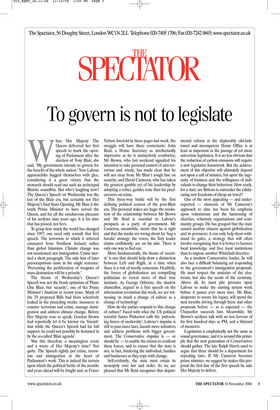To govern is not to legislate
When Her Majesty The Queen delivered her first speech to mark the opening of Parliament after the election of Tony Blair, she said, ŌĆśMy government intends to govern for the benefit of the whole nation.ŌĆÖ New Labour apparatchiks hugged themselves with glee, considering it a great victory that the monarch should read out such an archetypal Blairite soundbite. But whoŌĆÖs laughing now? The QueenŌĆÖs Speech on Wednesday was the last of the Blair era, but certainly not Her MajestyŌĆÖs final State Opening. Mr Blair is the tenth Prime Minister to have served the Queen, and for all the mischievous pleasure of his acolytes nine years ago, it is his time that has passed, not hers.
To grasp how much the world has changed since 1997, one need only consult that first speech. The terrorism to which it referred emanated from Northern Ireland, rather than global Islamism. Climate change was not mentioned, nor immigration. Crime merited a short paragraph. The only hint of later preoccupations came in the single sentence: ŌĆśPreventing the proliferation of weapons of mass destruction will be a priority.ŌĆÖ The theme of WednesdayŌĆÖs QueenŌĆÖs Speech was not the brash optimism of Phase One Blair, but ŌĆśsecurityŌĆÖ, one of the Prime MinisterŌĆÖs fixations in recent years. Many of the 29 proposed Bills had been selectively leaked in the preceding weeks: measures to counter terrorism and crime, manage immigration and address climate change. Before Her Majesty rose to speak, Gordon Brown had reportedly let it be known via ŌĆśfriendsŌĆÖ that while the QueenŌĆÖs Speech had his full support, he could not possibly be hemmed in by the so-called ŌĆśBlair agendaŌĆÖ.
Was this therefore a meaningless event and a waste of Her MajestyŌĆÖs time? Not quite. The Speech rightly put crime, terrorism and immigration at the heart of ParliamentŌĆÖs work. This is indeed the terrain upon which the political battle of the months and years ahead will be fought and, as Fraser Nelson foretold in these pages last week, the struggle will have three contestants: John Reid, a Home Secretary as intellectually impressive as he is instinctively combative; Mr Brown, who last weekend signalled his intention to take personal control of anti-terrorism and, wisely, has made clear that he will not stray from Mr BlairŌĆÖs tough line on security; and David Cameron, who has taken the greatest gamble yet of his leadership by adopting a softer, gentler tone than his predecessors on crime.
This three-way battle will be the first defining political contest of the post-Blair era. The personal stakes are huge: the resolution of the relationship between Mr Brown and Mr Reid is essential to LabourŌĆÖs prospects as a party of government. Mr Cameron, meanwhile, insists that he is right and that the media are wrong about his ŌĆśhug a hoodieŌĆÖ strategy: the voters, the Tory leader claims confidently, are on his side. There is only one way to find out.
More fundamentally, the theme of ŌĆśsecurityŌĆÖ is one that should help draw a distinction between Left and Right, at a time when there is a risk of woolly consensus. Healthily, the forces of globalisation are compelling politicians to reveal more of their true instincts. As George Osborne, the shadow chancellor, argued in a fine speech on the information revolution this week, we are witnessing ŌĆśas much a change of culture as a change of technologyŌĆÖ.
How do the parties respond to this change of culture? Faced with what the US political scientist James Pinkerton calls the ŌĆśpulverising forces of modernityŌĆÖ, LabourŌĆÖs impulse is still to pass more laws, launch more initiatives and address problems with bigger government. The Conservative impulse is ŌĆö or should be ŌĆö to enable the citizen to confront these forces, and to ensure that the state is not, in fact, hindering the individual, families and businesses as they cope with change.
Self-evidently, the state must retain its monopoly over law and order. So we are pleased that Mr Reid recognises that depart mental reform at the deplorably old-fashioned and incompetent Home Office is at least as important as the passage of yet more anti-crime legislation. It is no less obvious that the reduction of carbon emissions will require a new legislative framework. But the achievement of this objective will ultimately depend not upon a raft of statutes, but upon the ingenuity of business and the willingness of individuals to change their behaviour. How ready, for a start, are Britons to surrender the exhilarating new freedoms of cheap air travel?
One of the most appealing ŌĆö and underreported ŌĆö elements of Mr CameronŌĆÖs approach to date has been his emphasis upon voluntarism and the harnessing of charities, voluntary organisations and community groups. He has grasped that the state cannot insulate citizens against globalisation and its pressures: it can only help them withstand its gales, a strategy that will often involve recognising that it is better to harness local knowledge and free local institutions than to impose another Whitehall directive.
As a modern Conservative leader, he will also face a difficult balancing act responding to the governmentŌĆÖs immigration proposals. He must respect the anxieties of the electorate, but also the needs of the economy. Above all, he must pile pressure upon Labour to make the existing system work before it passes ever more laws. Mr Blair, desperate to secure his legacy, will spend the next months driving through these and other proposals before ŌĆö as is expected ŌĆö the Chancellor succeeds him. Meanwhile, Mr BrownŌĆÖs acolytes talk with no less fervour of his first hundred days as PM, and a blizzard of measures.
Legislation is emphatically not the same as sound governance, and it is around this principle that the next generation of Conservatives should gather. The late Ralph Harris used to argue that there should be a department for repealing laws. If Mr Cameron becomes prime minister, we suggest he makes this proposal the first line of the first speech he asks Her Majesty to deliver.


































































































 Previous page
Previous page